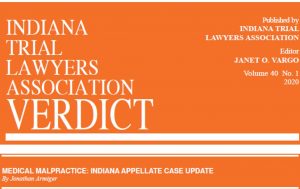Seventh Circuit Court of Appeals Asks Indiana Supreme Court to Answer Questions Regarding Application of Indiana’s Medical Malpractice Act
The United States Court of Appeals for the Seventh Circuit recently requested the Indiana Supreme Court address two questions through a process known as certification of questions. Both Seventh Circuit Rule 52(a) and Indiana Rule of Appellate Procedure 64 recognize federal courts may seek guidance from a state’s highest court on questions arising under the law of that state which will control the outcome of a case pending in federal court.
The questions arose out of a tragic car crash in Gibson County, Indiana, which claimed the lives of two drivers and a passenger. Sylvia Watson was driving from a repair shop in Owensville, Indiana to Princeton, when she approached a red light and exclaimed to the sole survivor of the crash, her granddaughter/passenger, Brandy Mayer, that she could not stop the vehicle. Watson’s vehicle struck a vehicle driven by Claudine Cutchin, whose daughter, Adelaide, was in the passenger seat. Claudine died at the scene and Watson and Adelaide died later from the injuries suffered.
A blood test on Watson revealed opiates in her bloodstream and Mayer recounted Watson had taken two pills before leaving the repair shop. It was later discovered that a physician had prescribed Watson eight different medications, including an opioid and muscle relaxers.
 Indiana Personal Injury Lawyer and Medical Malpractice Attorney Blog
Indiana Personal Injury Lawyer and Medical Malpractice Attorney Blog
















 Barsumian Armiger attorney Jonathan Armiger’s article examining recent Indiana medical malpractice cases was published in Volume 40, No 1 of the Indiana Trial Lawyers Association (ITLA) Verdict. The article is republished below with permission from ITLA.
Barsumian Armiger attorney Jonathan Armiger’s article examining recent Indiana medical malpractice cases was published in Volume 40, No 1 of the Indiana Trial Lawyers Association (ITLA) Verdict. The article is republished below with permission from ITLA.